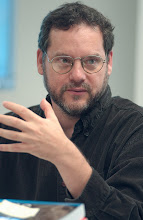EAOP Grad's Talk on Restoring Democracy Written Up in Brattleboro Newspaper
 Power to the people -- for a change
Power to the people -- for a changeBy BOB AUDETTE, Reformer Staff
Monday, October 15
BRATTLEBORO -- Power belongs to the people.
In the Declaration of Independence -- which came before the U.S. Constitution -- the signers were very clear in their intentions. "Governments are instituted among Men, deriving their just powers from the consent of the governed," they wrote. And though a government shouldn't be changed or abolished "for light and transient reasons," when it has become "destructive of these ends," they wrote, it keeps people from their unalienable rights -- life, liberty and the pursuit of happiness.
While admitting that most of mankind would rather live with the evil they know "than to right themselves by abolishing the forms to which they are accustomed," the signers of the Declaration gave Americans the right to stand up and be counted, said Ellen Hayes, of Advocates for Community Empowerment. With more than 25 people in attendance in the basement of Brattleboro Savings and Loan Saturday morning, Hayes said "democracy that the Declaration talks about has never been achieved."
"The Constitution is touted as one of the greatest democratic documents in the world," said Hayes. "It is not." Not only has the United States become an "empire state" in the tradition of the Great Britain it broke away from in 1776, she said, since the Civil War "the few have managed to institute laws backed by the armed might of the state to increase their control over property and commerce" at the expense of community and nature. You've been sold a bill of goods, said Hayes, and people need to learn the difference between what they've been told is the truth and what the truth actually is. Once you learn the truth, she said, communities can take steps to return decision-making authority to the people.
Corporations are able to manipulate the U.S. Constitution for their own means, and not for the public good, said Hayes, because the Constitution veered from the Declaration of Independence over the 11 years from 1776 to Sept. 17, 1787, when it was adopted by a group of landed elite, said Hayes. Over the years, corporate business interests have learned how to manipulate the law-making process to their advantage. The "corporate bill of rights," granting "personhood" to corporations, is another tool that businesses use, she said, "to get federal preemptive law to suppress everything else." But, she added, "there can be no supremacy clause for decisions that affect you directly."
Communities around the country are learning this for themselves and taking back control, said Hayes. "If you want to stop this problem at the root, here's what has already been done and upheld by the Supreme Court," said Hayes. By stepping back to the Declaration of Independence, you can force corporations to stay out, she said, adding nine states in the Midwest have laws banning corporate ownership of farms, said Hayes, excluding family-owned farms.
The corporations may have the legal decision on their side, "but do they have the legitimate decision on their side?" asked Hayes. For example, she said, in Barnstead, N.H., residents saw a battle being waged between a nearby town and a spring water company that wanted to bottle and ship its water to Europe. The towns have spent the last six years fighting the plan. Barnstead residents, wanting to avoid such a fate, realized the issue wasn't about water extraction, it was about who was making the decisions and were they in the best interests of the community. "If you define the problem as someone impeding your ability to self-governance, the answer is no longer parts per million or a funny definition of public good," said Hayes. "It's about who gets to make the final decision about something that directly affects my life, my family's life and future generations."
Residents of Barnstead banned corporations from extracting water in their town by reframing the debate as one about the right of self-governance and the rights of nature. By providing for rights for nature, she said, you give every citizen the ability to speak to issues in their community. "The only way this works is to build a majority and solidarity," said Hayes.
That's the only way to overturn policies that benefit corporations at the expense of consumers. By using the anti-discrimination laws and the guarantees of the 14th Amendment, corporations have been able to attain equal standing in the eyes of the law. "They are a fiction of our imagination to perform some kind of economic or public good and they're out of control."
Classes on democracy-based organizing are offered by the Daniel Pennock Democracy School, with its next session Nov. 16-18 in Bethlehem, N.H. The Democracy School is a 16-hour weekend dedicated to the study of American history, people's movements, how law is made, who makes the law, whose values the law serves and how real communities can use this education to change their organizing tactics and become more effective.
Advocates for Community Empowerment works with community groups to preserve democracy by using local law. The Saturday morning meeting was recorded by BCTV and will be scheduled for presentation at a later date. More information can be found at acene.org and celdf.org. The complete text of the Declaration of Independence can be found at ushistory.org/declaration/document/index.htm.


